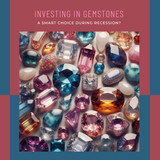Are Gemstones Good Investments During a Recession?

Gemstones can be a decent investment during a recession, but they come with both potential and pitfalls. Here's a quick breakdown:
Pros:
- Tangible Asset: Like gold, gemstones are physical and not tied to financial systems.
- Value Retention: High-quality gems (e.g., natural diamonds, sapphires, rubies, and tanzanites) tend to retain or even increase in value over time.
- Portability: They're compact, easy to store, and transport.
- Wealth Preservation: The ultra-wealthy often use gemstones to preserve wealth across generations or during financial instability.
Cons:
- Liquidity Issues: Selling gemstones can take time and you may not get full market value quickly.
- Lack of Transparency: The market isn't as standardized as gold or stocks—pricing depends heavily on quality, rarity, and certification
- Expertise Required: You need deep knowledge (or access to a trustworthy expert) to avoid overpriced or synthetic stones.
- High Transaction Costs: Buying and selling involves premiums, fees, and sometimes taxes.
Best Practices If You're Considering It:
- Focus on rare, certified stones.
- Stick with the "big four": Rubies, sapphires, emeralds and tanzanite, or investment-grade diamonds.
- Buy from reputable dealers and get GIA or similar certification.
- View it as a long-term hedge, not a short-term gain.
Want help evaluating a specific gem or investment idea, contact a Nzuri Gems Colored Stone Specialist or book a hassle-free virtual consultation
